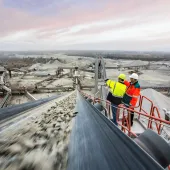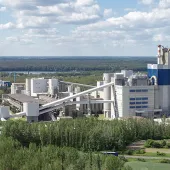
Aggregate Industries say a holistic approach to innovation will be key to realizing net zero pledge
WHILE welcoming the Government’s new ‘net zero’ carbon target, Aggregate Industries have been quick to assert that a much greater commitment to innovation, in every respect of the construction process, is vital if the industry is to help the UK in realizing a low-carbon future.
In continuing to lead the march on climate change, in June 2019 the Government set out new legislation designed to cut greenhouse gas emissions to almost zero by 2050. The target is the first to be set by any major economy in the world and a significant progression on the original one proposed in the 2008 Climate Change Act – a reduction of 80%.
For the UK construction industry this means there will be an increased pressure to reduce, if not eradicate altogether, environmental impact – a task which, according to Aggregate Industries, should be embraced as a positive stimulus for greater change.
Guy Edwards, chief executive officer of Aggregate Industries UK, said: ‘With the government committed to producing ‘net zero’ greenhouse gases by 2050, the construction industry’s role in safeguarding the future of our planet has never been more prevalent. In short, it means that, along with other sectors, emissions will have to be avoided completely or offset by planting trees or removing CO2 from the atmosphere.
‘Yes, it is a huge task, but the sector has been working hard in recent years to address these issues – we believe that having more stringent local targets in place will only work to drive the industry to cut emissions further and faster.’
As forerunners in their commitment to the sustainability plight, Aggregate Industries say they continue to apply an increasingly eco-friendly approach to all business areas; from introducing new product innovations and ensuring responsible sourcing through to the firm’s continued biodiversity efforts, alternative energy sources and smart logistics.
The company, for example, was the first to be certified to BES 6001: Framework Standard for the Responsible Sourcing of Construction Products (developed by the BRE), and the first construction materials supplier to achieve the BSI PAS 2080 verification for its commitment to supply low carbon solutions to infrastructure projects.
Moreover, the business currently purchases the entirety of its electrical grid demand from 100% renewable sources, largely from wind, and endeavours – like much of the industry – to use alternative fuels in various production processes.
On an overarching level, this is supported with an ongoing progression towards a regenerative circular-economy framework designed to ensure material longevity, which saw 800,000 tonnes of recycled asphalt pavement alone reused last year; along with a sustainable logistics approach, which helped reduce lorry movements by 381,500 journeys last year through greater use of ships and rail.
Mr Edwards commented: ‘The construction industry must become more radical and holistic in its approach to sustainability. In this way, we must deliver the infrastructure overhaul we need to establish real change; from optimizing energy efficiencies, embracing new power sources and adopting sustainable supply chains, helping to achieve nearly zero-energy buildings (NZEBs) and, in turn, work towards realizing the Government’s new pledge.
He continued: ‘While the magnitude of the task facing us in achieving net zero is clear, we’re confident that a forward-thinking, progressive industry like ours will take up the mantle and lead the way in demonstrating the lengths we can go to, to reduce our environmental impact, which will positively impact us all.’









